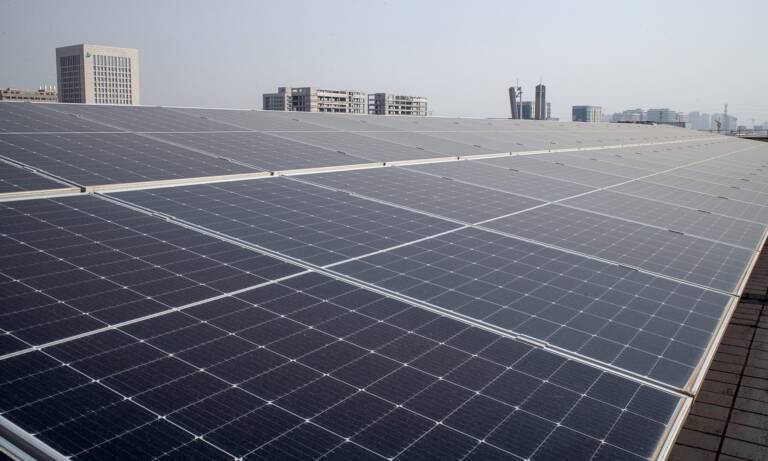Green energy: Chinese overproduction should only be temporary, or so they want you to believe

China's overcapacity in the clean energy sector will be temporary as long as global demand for green transitions holds up, according to two top former Chinese economic officials, who said more market opportunities should be explored through the Belt and Road Initiative.
This reading will be the basis of the Chinese authorities' defense against US and European accusations of excess production being used to crush European industry.
Last year, China saw strong growth in installed capacity and exports of solar panels and wind turbines, as well as staggering shipments of electric vehicles and lithium-ion batteries. But Beijing has faced trade restrictions on both sides of the Atlantic, blaming cheap Chinese exports for flooding international markets.
Capacity utilization of China's solar panel sector stands at just 70%, according to former People's Bank of China governor Zhou Xiaochuan, speaking at a roundtable of the Boao Forum for Asia in Hainan on Thursday.
Zhou also said that one of the factors contributing to excess capacity is the slow progress in upgrading power grids and installing energy storage facilities. “The excess capacity is likely only temporary, as the world will need to further ramp up clean energy development in the future”
Zhou also refuted Western claims that unfair trade practices and state subsidies had distorted markets for clean energy products.
While various levels of government have stepped in with aid in the early stages of industrial development, such as in research and development, he said government support has been withdrawn in recent years.
“Chinese solar companies now have hard-won experience and a dominant position globally, thanks to their technological advancements and unbeatable cost control,” Zhou said.
Faced with overcapacity, domestic market saturation and intensifying competition, more Chinese companies should look abroad to exploit potential markets, he said.
“In the first 20 years [of joining the WTO] China's growth story was about Chinese exports going global, and now Chinese companies have to go global… the golden age of double-digit export growth is now past,” Long said during a separate panel discussion.
China's tactic: overproduction as dumping
The European Union and the United States are targeting China for its excess production capacity, accusing it of using it to squeeze companies in other countries with artificially low prices. Chinese companies are being pushed into competition that can only find its solution by offloading industrial products abroad in small quantities.
The EU's anti-subsidy probe into Chinese electric vehicle exports could lead to punitive tariffs of up to 45%. The aim is to combat unfair competition which, according to the EU, harms European producers. The United States, for its part, considers new Chinese energy products as a threat to national security and is considering the introduction of high tariffs.
China has admitted that "overcapacity in some sectors", such as the automotive sector, is a problem. In 2023, the country will use less than half of its total passenger car production capacity, equivalent to approximately 55 million vehicles.
China's auto sector's capacity utilization rate has been below 50% since 2019. Only 20 of the country's 77 automakers have achieved rates above 60%, a level considered normal. So it means that Chinese factories are practically not producing.
Chinese overproduction is likely to be the focus of talks between US Treasury Secretary Janet Yellen and Chinese authorities. Denis Depoux , director general of German consultancy Roland Berger, argues that EU moves to limit Chinese imports would slow the bloc's green transition and efforts to reduce emissions.
Depoux points out that demand for renewable energy is increasing and that China's excess capacity could be absorbed in the coming years. However, the EU and the US fear that China is using its overproduction to gain an unfair competitive advantage, harming their countries' companies and workers.
However, there is a fact: Chinese overproduction actually causes a crisis in Western industry, however you want to look at it. This problem will have to find a solution, sooner or later.

Thanks to our Telegram channel you can stay updated on the publication of new Economic Scenarios articles.
The article Green energy: Chinese overproduction should only be temporary, or so they want you to believe, comes from Economic Scenarios .
This is a machine translation of a post published on Scenari Economici at the URL https://scenarieconomici.it/energie-green-la-sovrapproduzione-cinese-dovrebbe-essere-solo-temporanea-o-cosi-vogliono-far-credere/ on Fri, 29 Mar 2024 19:22:48 +0000.
